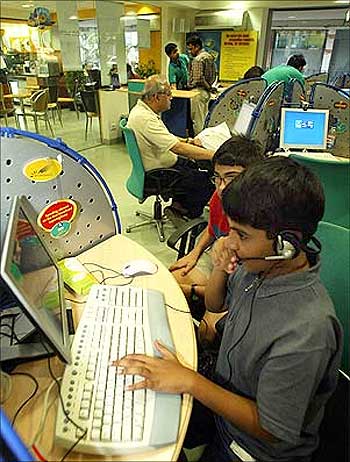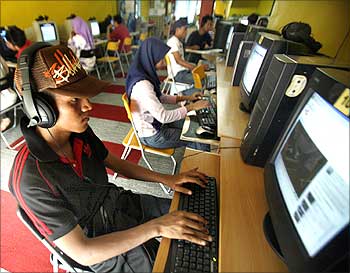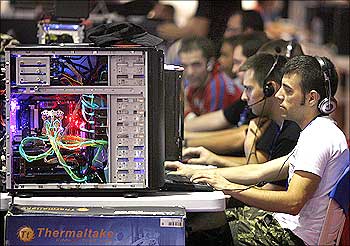
As the people of Egypt are finding out, the Net is about freedom -- to share creative ideas, to express dissent and oppose repression, says Rajni Bakshi.
President Hosni Mubarak cut off the Egyptian people's access to Internet and wireless services last week.
This was one way of responding to hundreds and thousands protestors who have been marching on the streets of Cairo demanding the ouster of Mubarak.
At the same time Chinese censors went to work sanitizing news reports about the unrest in Egypt and even blocked online discussions. They apparently fear that the Egyptian protestors may inspire calls for reforms in China.
The power of the Internet and wireless social networks, as tools of dissent and protest, is now well established.
What is not so well known is that the future of the Internet itself is under threat -- not just from dictatorships and repressive regimes, but from an assortment of private, profit-motivated entities.
. . .

Perhaps we take the World Wide Web too much for granted. One indication of this is that the 20th birth anniversary of the Web quietly slipped by in December 2010 with a noticeable absence of fanfare.
It was in December 1990 that the Web first went live -- on the desktop computer of Tim Berners-Lee, the man who designed the protocols which made it possible.
On that historic day the Web consisted of one Web site and one browser, both on the same computer.
That simple setup, as Berners-Lee says "demonstrated a profound concept: that any person could share information with anyone else, anywhere."
The Web evolved into a powerful, ubiquitous tool, he adds, because it was built on egalitarian principles by thousands of individuals, universities and companies working both independently and together.
. . .

In November 2010, on eve of the 20th anniversary, Berners-Lee made a passionate plea to defend the liberty of the web.
In an article, titled 'Long Live the Web: A Call for Continued Open Standards and Neutrality', published in the journal Scientific American, Berners-Lee outlined why the Web is threatened in several different ways.
Some of the Web's most successful inhabitants, Berners-Lee wrote, have begun to chip away at its principles: "Large social-networking sites are walling off information posted by their users from the rest of the Web. Wireless Internet providers are being tempted to slow traffic to sites with which they have not made deals. Governments -- totalitarian and democratic alike -- are monitoring people's online habits, endangering important human rights."
If these trends are allowed to go unchecked the Web as we have known it for two decades would cease to exist. Once we lose the freedom to connect to any website we want, the Web would be broken into fragmented islands.
This would not merely be fatal to our access to information and ideas. This would hurt democracy which includes the freedom from being snooped on, filtered, censored and disconnected.
. . .

Unhindered access to the Internet is now regarded as a fundamental right.
Here are some of the threats that Berners-Lee identifies.
Sites such as Facebook, LinkedIn, Friendster capture information as people enter them -- such as date of birth, e-mail address, what you like, who is friends with whom, etc.
These bits of data are assembled into brilliant databases but only within their sites. "Each site is a silo, walled off from the others. Yes, your site's pages are on the Web, but your data are not. You can access a Web page about a list of people you have created in one site, but you cannot send that list, or items from it, to another site" writes Berners-Lee.
This isolation occurs, adds Berners-Lee, because each piece of information does not have a URL (uniform resource locator). Consequently, most social-networking sites become a closed silo.
. . .

The more this happens the less universal the Web becomes. One response to this are projects, such as Status.net project, which runs sites that enable people to operate their own Twitter-like network minus the Twitter-like centralization.
Another vital component of Web freedom are open standards.
"Open, royalty-free standards that are easy to use create the diverse richness of Web sites, from the big names such as Amazon, Craigslist and Wikipedia to obscure blogs written by adult hobbyists and to homegrown videos posted by teenagers" wrote Berners-Lee.
By contrast, for example, Apple's iTunes system is proprietary so information there cannot be sent through a link to someone else.
"The iTunes world is centralized and walled off. You are trapped in a single store, rather than being on the open marketplace. For all the store's wonderful features, its evolution is limited to what one company thinks up."
. . .

It has now become possible for a company or government to manipulate the Internet and interfere with an individual Web user's access. This violates the concept of Net neutrality which is meant to ensure that your Internet Service Provider cannot alter the speed of the connection as you browse.
This can be used to make your access to certain commercial or political sites more rapid than others -- while denying you access to some sites altogether.
Some companies have suggested that net neutrality should not apply to mobile phone-based connections. This would dis-empower the millions of new, mostly low-income, users who are only accessing the Web on their mobile phones.
The good news is that Berners-Lee is not a lone crusader. Most of the issues he has highlighted are being tackled by groups across the world, for example the United States-based 'SaveTheInternet.com'.
This body is currently demanding a US Congressional investigation on the role of American companies in the Egyptian crackdown.
. . .

This site's home page informs us that the Egyptian government has used 'Deep Packet Inspection' (DPI) equipment, allegedly sold by the Boeing owned company Narus, to track, target and crush political dissent over the Internet and mobile phones.
SavetheInternet.com is campaigning for legislation that would protect Net Neutrality. People are urged to express their support by spreading the word about the need for Internet freedom -- something that most people don't even know is endangered.
The bad news is that if most of us continue to take the freedom of the World Wide Web for granted and ignore such issues the future of freedom itself looks grim.
This is not just about browsing undisturbed or unwatched. As the people of Egypt are finding out it's about freedom -- to share creative ideas, to express dissent and oppose repression.